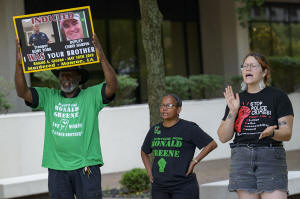Federal prosecutors won't seek charges in deadly arrest of Black
motorist Ronald Greene
 Send a link to a friend
Send a link to a friend
 [January 15, 2025]
By JIM MUSTIAN [January 15, 2025]
By JIM MUSTIAN
Federal prosecutors told family members Tuesday they will not bring
charges in the deadly 2019 arrest of Black motorist Ronald Greene,
closing the books on a lengthy FBI investigation into the white troopers
who stunned, punched and dragged Greene on a roadside and allegations of
an attempted cover-up by the Louisiana State Police.
The U.S. Justice Department informed Greene's family of the decision as
officials were also preparing to release findings from a broader civil
rights investigation that found a pattern of state troopers using
excessive force, according to two officials familiar with the inquiry.
The officials spoke to The Associated Press on condition of anonymity
because they could not publicly discuss details ahead of an announcement
expected later in the week.
That “pattern-or-practice” inquiry, launched in 2022, followed an AP
investigation that found Greene’s arrest was among at least a dozen
cases in which state troopers and their bosses ignored or concealed
evidence of beatings, deflected blame and impeded efforts to root out
misconduct in the agency. In one case, a white trooper pummeled a Black
man 18 times with a flashlight following a traffic stop, leaving him
with a broken jaw, broken ribs and a gash to his head.
“There’s no closure here,” Greene’s mother, Mona Hardin, told AP after
meeting with prosecutors. “I knew it was coming. They’re just pouring
sugar on s—-.”
The AP's reporting also turned up state police violence against white
suspects, including one beaten beyond recognition. Troopers shared the
man's photograph in jeering text messages, saying he “shouldn’t have
resisted” and joking that his injuries had been caused by a fall
following his 2019 arrest.

Federal prosecutors opened grand jury investigations into some of the
cases but closed most of them without charges. In the Greene case, they
wavered for years on whether to indict the troopers captured on graphic
body-camera video swarming his vehicle following a high-speed chase
outside Monroe, Louisiana.
The body-camera footage, withheld by officials for two years but
published by AP in 2021, showed troopers swarming Greene even as he
appeared to raise his hands, plead for mercy and wail, “I’m your
brother! I’m scared! I’m scared!” Troopers repeatedly jolted Greene with
stun guns before he could even get out of the car, with one of them
wrestling him to the ground, putting him in a chokehold and punching him
in the face. Another called him a “stupid motherf---—.”
They then ordered a shackled Greene to remain face down on the ground, a
prone restraint that experts said could have dangerously restricted
Greene’s breathing.
State police initially blamed the 49-year-old’s death on a crash
following a high-speed chase over a traffic violation. But that
explanation was called into question by photos of Greene’s body on a
gurney showing his bruised and battered face, a hospital report noting
he had two stun gun prongs in his back and the fact that his SUV had
only minor damage. Even the emergency room doctor questioned the
troopers’ initial account of a crash, writing in his notes: “Does not
add up.”
[to top of second column]
|

From left, Lumumba Lutalo, Angela "Mama Ghost" Green and Antonia
Mar, of New Orleans for Community Oversight of Police, take part in
a rally for justice for Ronald Greene at the Eastern District of
Louisiana Courthouse in New Orleans, on May 10, 2024. (AP
Photo/Matthew Hinton, File)

A reexamined autopsy ordered by the FBI ultimately debunked the
crash narrative and listed “prone restraint” among other
contributing factors in Greene’s death, including neck compression,
physical struggle and cocaine use.
A federal indictment seemed imminent for several years, so much so
that federal prosecutors asked the local district attorney to hold
off on bringing state charges until the FBI inquiry ran its course.
They later reversed course, and, in late 2022, a state grand jury
indicted five officers on counts ranging from negligent homicide to
malfeasance.
The state case withered away to charges against just two of those
officers, one of whom dragged Greene by his ankle shackles and
pleaded no contest last year to misdemeanor battery. The lone
remaining defendant in the case is scheduled to enter a similar plea
this week, concluding the state proceedings.
Perhaps the most significant hurdle to federal charges was the
untimely death of Chris Hollingsworth, the trooper who was seen on
the video repeatedly bashing Greene in the head with a flashlight
and was later recorded by his own body camera calling a fellow
officer and saying, “I beat the ever-living f--- out of him.”
Hollingsworth died in a high-speed, single-vehicle crash in 2020,
hours after he was told he would be fired over his actions in
Greene’s death.
Another major sticking point was whether prosecutors could prove the
troopers acted “willfully” in abusing Greene — a key component of
civil rights charges that has complicated such prosecutions around
the country. The FBI even enhanced the video of the arrest in an
ultimately inconclusive attempt to determine whether he had been
pepper-sprayed after he was in custody, focusing on an exchange in
which a deputy jeeringly said, “S--- hurts, doesn’t it?”
But the federal investigation also included a lengthy focus on the
state police brass suspected of obstructing justice by suppressing
video evidence, quashing a detective’s recommendation to arrest a
trooper and pressuring a state prosecutor.
Still pending is the federal wrongful death lawsuit Greene’s family
filed four years ago seeking damages from the officers, who have
denied wrongdoing. The civil case was long put on hold as the
criminal proceedings played out.
All contents © copyright 2025 Associated Press. All rights reserved
 |